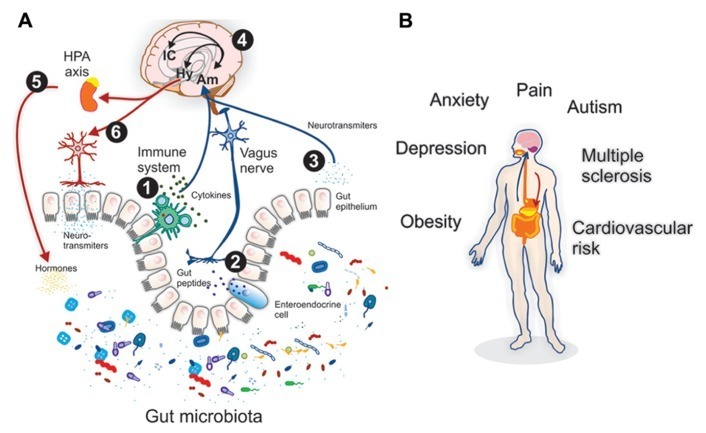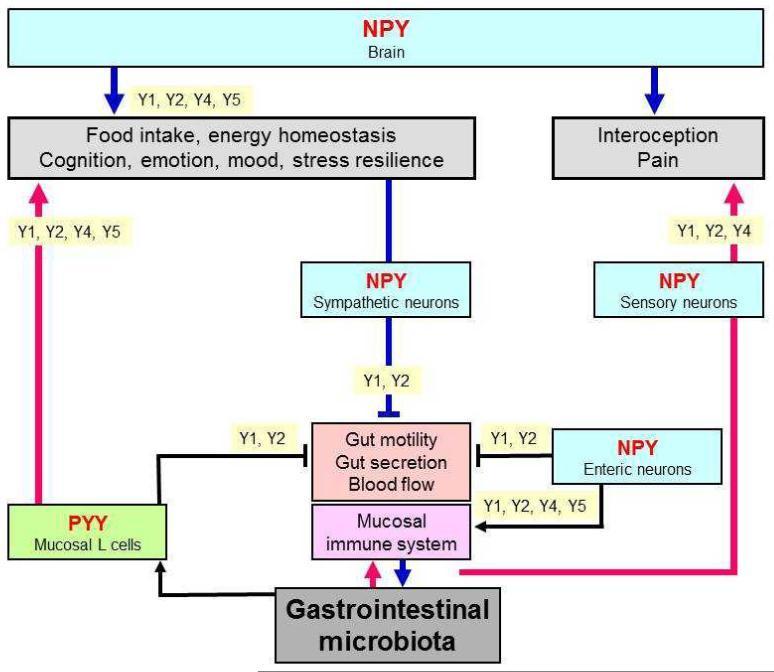Eating Disorders, Mental Health, and the Gut Microbiome

There are currently 30 million people in the United States alone who suffer from eating disorders,1 where the related science and mental health are overlooked in their diagnoses.2 3 A new study, published by the journal of Psychosomatic Medicine, found new evidence of an association between the gut microbiota and the eating disorder anorexia.4
Researchers (and more mainstream sources) are beginning to understand just how much impact our gut has on nearly everything in our body – including our brain.5 6 7 Since nearly 90% of the body’s serotonin is made in the digestive tract – what’s going on in your gut – may be causing what’s going on inside your brain.8

Montiel-castro AJ, González-cervantes RM, Bravo-ruiseco G, Pacheco-lópez G. The microbiota-gut-brain axis: neurobehavioral correlates, health and sociality. Front Integr Neurosci. 2013;7:70.

Holzer P, Farzi A. Neuropeptides and the microbiota-gut-brain axis. Adv Exp Med Biol. 2014;817:195-219.
The researchers’ findings were remarkable. Individuals suffering from anorexia nervosa have not only one of the highest mortality rates,9 but also have very different microbial populations residing inside their guts, compared with healthy populations.10 How does this relate to a Paleo diet? Quite simply – what you eat plays a huge role in influencing your microbial population.11
There are of course a host of other factors, excluding diet that can influence your microbiome, but for our purposes, think of it as a basic equation: Bad food = bad microbial population in your gut = depression and anxiety, among other conditions. Good food = the opposite.
This is certainly an over-simplification, but for practical purposes, it works well. I’ll preface this with the importance of keeping your health and wellness in perspective and go from one extreme to another. A Paleo approach is meant to guide your lifestyle, not consume it. Since a Paleo diet focuses upon food quality – not calories – it is oftentimes a good antidote to those who have food restriction behaviors.
If you were to go back to the 1950s, and tell a scientist or member of the general populace that what we have in our guts, in terms of microbes, would affect our weight or behavior – they would have escorted you away to a psychiatric ward. But, in the fascinating world of present day modern science, studies have shown the gut microbiome is indeed linked to weight gain, behavior, and even attention deficit disorders like ADHD.12 13 14 15 It’s not all so farfetched after all.
In the context of eating disorders, the microbiome is basically that of a spiral. The worse you eat, the worse your microbe population becomes, and the worse your mood and behavior fairs. Again, this is an oversimplification, but the analogy works. In a life filled with constant stressors, unpredictability, and other problems, if you follow the simple paradigm to make positive changes to our health and lifestyle, we can take back control.
A Paleo diet will provide your body with a wide array of beneficial nutrients that allow your gut bacteria to thrive, not hurt you. The human microbiome is basically an interface between our genes and our history of environmental exposures. Eating a healthy diet can only positively influence your gut microbiome.16
The science is far from definitive yet, but explorations of our microbiome continue to provide the chance of providing new answers into our own neurodevelopment – and behavior. If you or a loved one are suffering from an eating disorder, know that you are not alone and that healing your relationship with food and your body is possible, and professional counseling to help you overcome it is available.
For general information on mental health and to locate treatment services in your area, call the Substance Abuse and Mental Health Services Administration (SAMHSA) Treatment Referral Helpline at 1‑877‑SAMHSA7 (1‑877‑726‑4727). SAMSHA also has a Behavioral Health Treatment Locator on its website that can be searched by location.
References
1. Wade, T. D., Keski-Rahkonen A., & Hudson J. Epidemiology of eating disorders. In M. Tsuang and M. Tohen (Eds.), Textbook in Psychiatric Epidemiology (3rd ed.). New York: Wiley, 2011. p. 343-360.
2. Bulik CM, Tozzi F. Genetics in eating disorders: state of the science. CNS Spectr. 2004;9(7):511-5.
3. Wilson GT. Eating disorders, obesity and addiction. Eur Eat Disord Rev. 2010;18(5):341-51.
4. Kleiman SC, Watson HJ, Bulik-sullivan EC, et al. The Intestinal Microbiota in Acute Anorexia Nervosa and During Renourishment: Relationship to Depression, Anxiety, and Eating Disorder Psychopathology. Psychosom Med. 2015.
5. Gareau MG. Microbiota-gut-brain axis and cognitive function. Adv Exp Med Biol. 2014;817:357-71.
6. Holzer P, Farzi A. Neuropeptides and the microbiota-gut-brain axis. Adv Exp Med Biol. 2014;817:195-219.
7. Montiel-castro AJ, González-cervantes RM, Bravo-ruiseco G, Pacheco-lópez G. The microbiota-gut-brain axis: neurobehavioral correlates, health and sociality. Front Integr Neurosci. 2013;7:70.
8. Kato S. Role of serotonin 5-HT₃ receptors in intestinal inflammation. Biol Pharm Bull. 2013;36(9):1406-9.
9. American Journal of Psychiatry, Vol. 152 (7), July 1995, p. 1073-1074, Sullivan, Patrick F.
10. Available at: //www.sciencedaily.com/releases/2015/10/151005121310.htm. Accessed October 8, 2015.
11. Conlon MA, Bird AR. The impact of diet and lifestyle on gut microbiota and human health. Nutrients. 2015;7(1):17-44.
12. Petra AI, Panagiotidou S, Hatziagelaki E, Stewart JM, Conti P, Theoharides TC. Gut-Microbiota-Brain Axis and Its Effect on Neuropsychiatric Disorders With Suspected Immune Dysregulation. Clin Ther. 2015;37(5):984-95.
13. Turnbaugh PJ, Ridaura VK, Faith JJ, Rey FE, Knight R, Gordon JI. The effect of diet on the human gut microbiome: a metagenomic analysis in humanized gnotobiotic mice. Sci Transl Med. 2009;1(6):6ra14.
14. Sweeney TE, Morton JM. The human gut microbiome: a review of the effect of obesity and surgically induced weight loss. JAMA Surg. 2013;148(6):563-9.
15. Sampson TR, Mazmanian SK. Control of brain development, function, and behavior by the microbiome. Cell Host Microbe. 2015;17(5):565-76.
16. Gonzalez A, Stombaugh J, Lozupone C, Turnbaugh PJ, Gordon JI, Knight R. The mind-body-microbial continuum. Dialogues Clin Neurosci. 2011;13(1):55-62.
Casey Thaler, B.A., NASM-CPT, FNS
Casey Thaler is a certified personal trainer and nutrition specialist.
More About The Author




